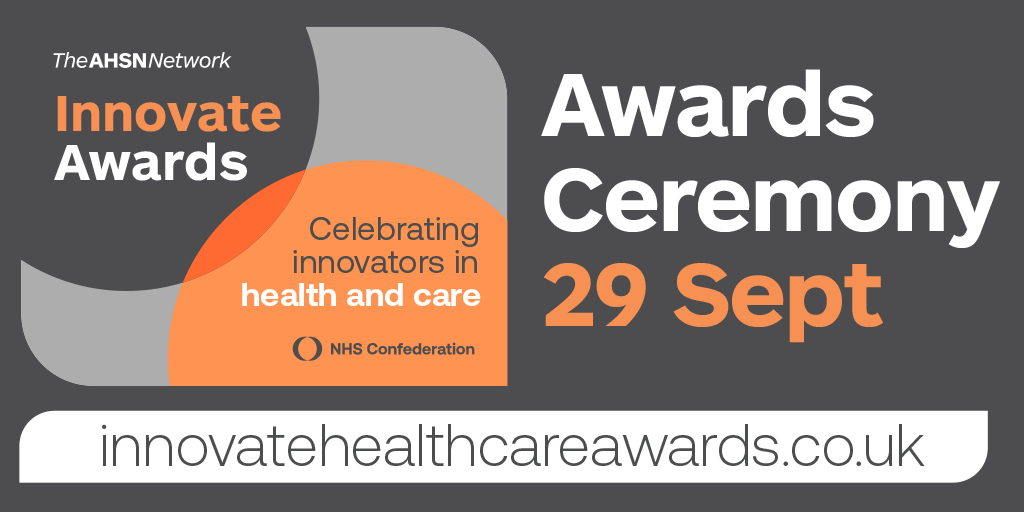
The finalists for The Innovate Awards 2022 have been revealed following a rigorous round of judging over the summer, and we’re pleased to report that four projects from the West of England are on the shortlist.
Organised by NHS Confederation and The AHSN Network, the inaugural Innovate Awards saw a grand total of 194 entries from health and care teams across the country covering ten award categories. The ten eventual winners will also compete for ‘Innovation Champion of the Year’ to be announced at the award ceremony in London in September.
The four finalists from the West of England are:
StartWell > EndWell – North Bristol NHS Trust
Shortlisted in the Innovation Spread category
Start Well > End Well is a simple three-step daily process for managers to support the wellbeing of staff. The process involves checking-in, pit-stop debriefs, and checking out to enhance wellbeing and reduce the likelihood of traumatic responses.
It was developed using a psychologically-informed structure during Covid in response to the massive shift of our workforce from their normal duties to mobilise to deal with the pandemic.
Start Well > End Well has now been adopted by NHS England as a best practice template and is being adopted across the country.
Improving patient choice in the prescription of heparins – North Bristol NHS Trust
Shortlisted in both the Excellence in Patient and Public Involvement in Transformation and Innovation category and the Innovation Helping Address Health Inequalities category
Following a national drive to reduce in-hospital blood clots, North Bristol NHS Trust has been routinely prescribing a low molecular weight heparin, Enoxaparin, to at-risk patients prophylactically. This medication is derived from porcine products and may not be appropriate for some patients for a range of both religious or non-religious beliefs, particularly Muslim patients for whom pork or porcine-derived gelatine is Haram (forbidden).
Funded by donations to Southmead Hospital charity, a project was set up to work with affected groups to improve patient choice in the prescription of low molecular weight heparin, and educate staff on the animal contents of Enoxaparin and the blood thinning medication options available. Taking a Patient and Public Involvement approach, the project team has been working with patients, staff and community leaders to develop educational materials for patients and a bespoke training programme for staff to improve transparency and patient choice.
Adapting the dementia care pathway for South Asian families: the ADAPT toolkit – University of the West England
Shortlisted in the Diversity in Innovation category
People from South Asian communities are at greater risk of developing dementia but are less likely to access all points of the care pathway – and more likely to present in crisis and/or at a later stage. They are more likely to face barriers including a late or missed diagnosis, reduced access to treatments, and inappropriate or inadequate support coupled with problems caused by language barriers. They often rely on local, community-led organisations for support.
This new toolkit hosted by the Race Equality Foundation provides enhanced care for members of South Asian communities, many of whom receive significantly less effective dementia care from statutory services compared to their counterparts from White British communities. Find out more about the toolkit here.
COVID virtual ward – Baywater Healthcare and NHS Gloucestershire
Shortlisted in the Outstanding Collaboration with Industry category
The mobilisation of the Virtual Ward in Gloucestershire utilised Baywater Healthcare’s telehealth technology and expertise to actively support the COVID-19 challenge in the region. Over 6,000 patients have used the Virtual Ward so far, enabling identification of over 1,000 unwell people who needed to be admitted to hospital.
Dr Hein Le Roux, One Gloucestershire ICS Clinical Quality Lead, said: “We are incredibly proud that our COVID Virtual Ward has made the official shortlist for The Innovate Awards against tough competition.
“The Virtual Ward scheme has helped us to transform the way we care for people who have COVID. We know that people often recover best in their own home, but getting a diagnosis of COVID can feel frightening, especially for people who live alone. The Virtual Ward allows us to support people at home, giving them reassurance that help is available if they need it.
“We are really grateful to patients and their carers for engaging with this initiative so well, as well as the many local clinicians and telehealth experts involved.”
Watch this short film to find out more:
Commenting on the awards, Matthew Taylor, Chief Executive of NHS Confederation said: “Judges across all the award categories have remarked on how impressive and inspiring the work contained in these submissions has been. It has been a delight to see the wonderful efforts taking place in terms of innovation in the health and care sector and it is hugely important to recognise and celebrate this.”
Find out more about all the finalists in this year’s Innovate Awards here.
Posted on September 5, 2022


